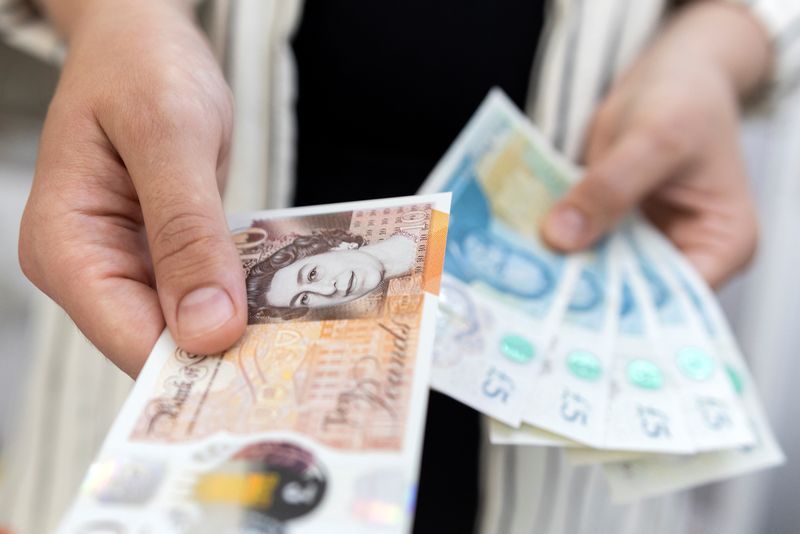By Mike Dolan
LONDON (Reuters) -The view that the pound is hitting its highest since the 2016 Brexit referendum following a surprise British election announcement is hard to ignore – and could point to hopes for a recovery from Brexit-related economic damage.
In what the Peterson Institute for International Economics in Washington this week described as a “self-inflicted wound”, Britain’s messy exit from the European Union has haunted foreign investment, the pound and British markets for almost a decade.
It seems uncontroversial to most observers that Brexit is now damaging the economy. Just last month, Clare Lombardelli, the next deputy governor for monetary policy at the Bank of England (BoE), said that “there is evidence that Brexit has had a negative economic impact through investment and trade.”
While parallel shocks from the pandemic and Ukraine-related energy and inflation spikes make the precise size of the negative hit difficult to measure, Lombardelli’s analysis shows that Brexit has led to a large and long-lasting increase in uncertainty and reduced investment, production and productivity. .
Apart from the experts, the public already seems to realize this.
Opinion polls now consistently show that those who think it was wrong to leave the EU are around 20 points ahead of those who still think it was right. Some show a large majority even before re-entry.
Whether a likely change in government will significantly shift the dial on this issue is still far from clear, but relations between Britain and the European Union could hardly get much worse than they have been for the past eight years.
The surprise announcement of the July 4 election this month left the pound and broader British asset prices largely untouched, with betting markets now giving a more than 90% chance of the opposition Labor party returning to power for the first time in 14 years, with indications from opinion polls. consistently above 20 points.
As always, a flurry of other factors are influencing sterling’s recent rise, not least the scaled-back expectations for a BoE rate cut in the summer.
But the pound’s increasing strength following a change in government – including the rise against the euro to levels not seen since before the government budget farce of late 2022 – appears to be more than just a cyclical turn.
The BoE’s trade-weighted sterling index this week hit its strongest point since the 2016 referendum that ultimately took Britain out of the EU in 2020, 47 years after the country joined the single market.
Although the pound is still around 5% below pre-referendum levels, it has recovered more than 10% from the bottom of its budget-related collapse in 2022 and is up around 2.5% this year alone.
But the return to 2016 levels is a notable milestone. And what’s more, long-unloved and heavily discounted British stocks finally joined their peers at record highs this month, despite the pound’s rise.
THE ASSIDE OF LABOR
While Labor has been keen to avoid what it sees as a divisive Brexit issue over the unrest and has ruled out plans to return to the EU’s single market or customs union, it has pledged to renegotiate the post-Brexit agreement with the Brussels trading bloc.
Last September, Labor leader and likely next Prime Minister Keir Starmer promised to improve trade relations with the EU by 2025 if his party won the election.
Starmer said he would pursue closer ties with the EU when the partnership comes up for review next year, with the aim of improving the 2021 Trade and Cooperation Agreement (TCA) struck by former Prime Minister Boris Johnson in areas including security, innovation and research.
That sounds marginal and far from any suggestion of a major Brexit reversal.
But the kind of large Labor parliamentary majority currently expected could give a new government significant leeway to re-engage with Brussels on a range of issues, should it wish to do so.
For markets monitoring the situation, the publication of election manifestos in the coming weeks now marks the next moment, even though hopes for anything concrete on Brexit in this regard are low and opinion polls show that the issue is currently low on the agenda. list of voters’ priorities.
Gilles Moec, chief economist at AXA Investment Managers, doubts whether either party will want to tackle Brexit head-on before the election, even though he thinks this is the “elephant in the room” when it comes to the overall economic picture.
And JPMorgan’s Allan Monks fears the absence of anything sharper in his manifesto could mean Labor will not have a mandate to take stronger action in the coming years.
“Governments often deviate from manifesto commitments, but given the controversy surrounding this issue, that seems highly unlikely without a public vote here,” Monks said. “The TCA is due for review… but the EU has indicated that this is about solving teething problems and not an opportunity to open the agreement to meaningful changes.”
Low expectations give way to a surprise? Or maybe there are just other fish to fry?

Brexit hope or not, the pound seems to be making its own decision either way.
The opinions expressed here are those of the author, a columnist for Reuters.


